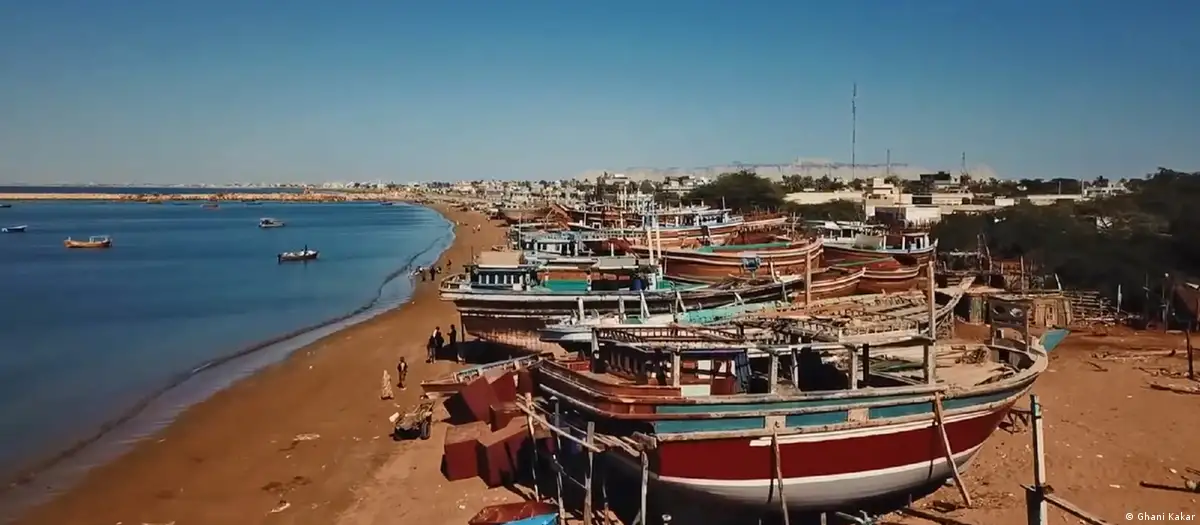The China-Pakistan Economic Corridor (CPEC) and its expansion projects are gathering pace as China desires to play a bigger role in regional connectivity. Are these projects influenced, or are they influenced at present, by India’s interference?
China, the principal ally of Pakistan, the other main rival of India, is on the verge of becoming a regional hegemon, and India, with the help of the United States, is trying to contain her. In this context, CPEC—an infrastructure project started in 2013 and worth more than $46 billion—has currently grown to an estimated $62 billion. Now China wants to expand CPEC to Afghanistan, which is of great importance.
CPEC will connect China’s largest province, Xinjiang, with Pakistan’s Gwadar port in Balochistan. This makes it obvious that this project will result in the deepening of economic ties between Pakistan and China; this notion is found to be detrimental to India.
The topic is meant to address all dimensions in which CPEC and its expansion projects can be influenced or are influenced at present by India’s interference.
CPEC: Expansion and Hurdles
Uzbekistan is a landlocked country, and CPEC is an opportunity for Uzbekistan to expand its market through Gwadar deep seaport and transport its goods anywhere in the world. Through rail and road connectivity, China’s Belt and Road Initiative (BRI) would interlink the region. Uzbekistan, Tajikistan, Turkmenistan, Kyrgyzstan, and Kazakhstan have already shown interest.
With its BRI, China envisions a future of vastly expanded road, rail, and port networks and, as a result, an unprecedented growth of its global economic influence. China’s interest in Afghanistan stems from its longstanding interest in exploiting Afghanistan’s mineral resources, which China has been experimenting with in mining projects in Balochistan since 2002. Chinese companies have made an undeniable profit from mining projects in Balochistan. Mining is an undeniably valuable business that necessitates a road and rail network. Since the road and rail network connecting China and Pakistan is already in place, it only requires the building of roads and rails in Afghanistan.
Due to security concerns at Pakistan’s western front, CPEC projects are delayed, creating hurdles for China to make Gwadar Port fully operational.
Even though disturbances in Balochistan and Khyber Pakhtunkhwa (KP) and cross-border clashes with Afghanistan are a barrier to China’s plan to expand BRI to Afghanistan and beyond, it believes it is worth taking the risk.
China is undeniably convinced: It will not only accelerate economic growth but will also pave the way for regional connectivity. Zhao Lijian, a former foreign minister’s spokesperson, agreed, saying,
“China would like to work with Pakistan for the high-quality development of the CPEC and extend it to regional countries, improve people’s well-being, and play a bigger role in regional connectivity and economic integration.”
Trans-Afghan Railway Project
The starting point of Uzbekistan’s strategy was access to Pakistani ports. Uzbekistan, being a landlocked country, has always been on the periphery of major global markets. The discussion about building the Trans-Afghan railway project as an extension of CPEC is gaining momentum after the withdrawal of the United States from the region. The Trans-Afghan railway project is the shortest and most economical route connecting Termez, the capital of Uzbekistan, in the south, with Gwadar Port in the south of Pakistan.
The railway line connects Tarmez, Mazar-i-Sharif, Kabul, and Peshawar, clearing the way for trade in the region. The significance of CPEC and its expansion would also help landlocked Afghanistan become a vital part of the BRI. The Afghan official, in a statement, said:
“Regional connectivity and economic integration are part of its soon-to-be-launched foreign policy.”
The Russia-Ukraine conflict has changed the dynamics of supply routes, particularly in Uzbekistan. It would bring a shift in the trade routes across Central Asia, enabling Uzbekistan to implement a more independent trade policy and diminish its dependency on Iran and Russia. Once a 573-kilometer (about 356.05 mi) railway line is completed from Uzbekistan to Pakistan via Afghanistan, the travel time for goods transit would reduce from 35 days to 4 days, approx. Afghanistan and Pakistan are the key factors for unleashing Uzbekistan’s desires in the region. Comparatively, Afghanistan is a newborn state and requires finances to establish a strong government. Afghan transit would help Afghanistan overcome financial hazards and strengthen its relationships with its immediate neighbors.
India: Attempts at Isolating Pakistan
Along with backing insurgencies in Pakistan, India is also busy cultivating and strengthening anti-Pakistan sentiments in Afghanistan by using its soft power potential.
India is also playing the diplomatic role of isolating Pakistan from the world. General Joseph Votel, the former commander of US Central Command, stated:
“The isolation policy of India against Pakistan is hindering relations between Pakistan and India; hence, a policy shift is needed that might bring both states to common ends.”
CPEC is detrimental to India as it promises to ensure the economic stability of Pakistan and further strengthen Sino-Pak bilateral relations. India is making great efforts to derail and ultimately obliterate the project. With the expectation that this Indian behavior will continue in the future, there is an urgent need to address the situation and implement appropriate countermeasures.
Pakistan and India both are nuclear powers and know the consequences of nuclear war; hence, indirect strategies are adopted by both, but what India can do best here is hinder the CPEC project as Pakistan is a weaker enemy than China. Currently, Pakistani law enforcement forces are dealing with the insurgencies covertly cultivated by India in Balochistan and KP. The situation due to Indian-funded militants in Balochistan and KP is hurting Pakistan’s internal stability. Pakistan has provided evidence of such Indian involvement in Pakistan and indirect funding, which can be traced back to India, the United Nations (UN), and other significant international forums. For decades, indoctrinating the Baloch population with radicalism, insecurity, and defection has been critical to motivating militants. The Tehrik-i-Taliban Pakistan (TTP) and terrorist groups in Balochistan are now fighting together against Pakistan’s state, as also stated in an ISSRA (Institute for Strategic Studies, Research and Analysis) insight:
“It is reported that several individuals of these terrorist organizations are still under training in India.”
India has allegedly trained the Islamic State Khorasan Province (ISKP) and TTP elements in Afghanistan to use as a proxy against Pakistan. TTP is increasingly active in cross-border activities. The security situation at Pakistan’s western border in the coming months is set to become increasingly complex.
Possible Countermeasures
The issue is serious, but if certain lacunae are addressed, some of the issues can be solved and the intensity of others can be reduced. As far as the idea of internationalizing the Kashmir dispute is concerned, it can be considered a neutral one, as only Pakistan and India should resolve their own issues and get economically interdependent to generate dependency and reduce the element of dispute. The issues can be resolved if the Indian policy towards CPEC is more pragmatic and flexible. India’s policy of isolation and negative intentions should be reduced, and that is only possible through dialogue with Pakistan. With the help of China, this should produce opportunities for confidence building, which will induce the thought of coexistence. For India’s insecurities to be met and answered in a proper and permanent way to bring India closer strategically, both states need to understand their significance and should avail themselves of all opportunities without disrupting the prosperity and development of the region. General Joseph Votel, the former commander of US Central Command, stated:
“India’s lack of attention towards the India-fused militants at Pakistan’s western front, which are spreading fear and insurgencies, should be addressed, and India should stop such acts of terrorism and illegitimate interference.”
The matter of Pakistan and India is fragile and must be dealt with through selective measures, strategic planning, and long-term agenda setting. The role of the media in this regard is critical, as it should portray feelings of cooperation, interdependence, and coexistence. Shanghai Cooperation Organization (SCO) is another aspect in which India and Pakistan are standing together. Both states should understand that the need for cooperation is a matter of time and should be addressed to promote sustainability and prosperity in the region.
The Way Forward
CPEC is the only and immediate way in which Pakistan can improve its reputation globally and bring more and more opportunities within its borders. Pakistan is a state struck by terrorism and all sorts of instabilities; CPEC is the way out of these lacunas and lapses, and Pakistan as a nation should strive to maximize its power in terms of economy, military, international investment, and infrastructure so that the national recognition of Pakistan as a state can be boosted globally. The historical and traditional grievances of both India and Pakistan are deep-rooted and do not have immediate solutions. Diplomatic and economic attractions are found to be the solutions for current problems, which are still a far cry. Both governments and stakeholder groups should focus on areas of convergence instead of areas of divergence and maintain ties to egalitarianism.



![Ukrainian and Russian flags with soldier silhouettes representing ongoing conflict. [Image via Atlantic Council].](https://southasiatimes.org/wp-content/uploads/2026/02/2022-02-09T000000Z_1319661209_MT1NURPHO000HXCNME_RTRMADP_3_UKRAINE-CONFLICT-STOCK-PICTURES-scaled-e1661353077377.jpg)



![Truck traveling along the Makran Coastal Highway in Balochistan, with rugged cliffs and the Arabian Sea coastline in the background [Image via Getty Images].](https://southasiatimes.org/wp-content/uploads/2026/02/Balochistan-2.webp)